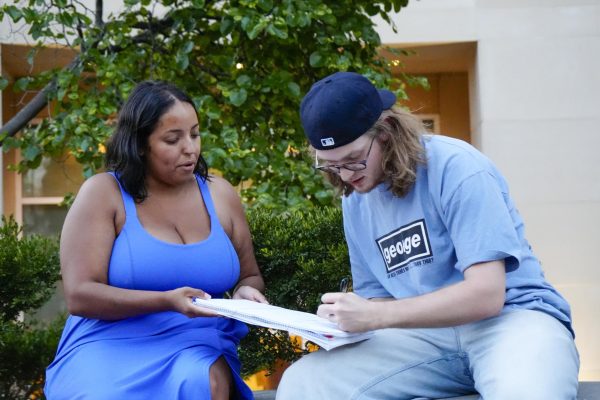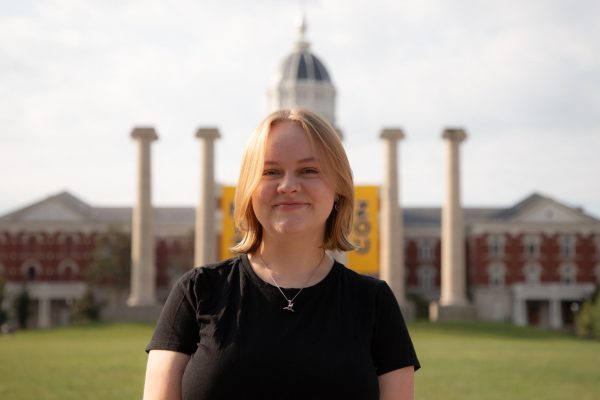Two opposing groups of Columbia community members gathered Monday, Oct. 6, outside the Daniel Boone City Building. One group, CoMo Renewal Project, advocated for increased police presence downtown. They voiced their disapproval of how city funding is distributed and their support for a new ordinance to increase enforcement of panhandling laws. The other group advocated against increased enforcement of panhandling laws.
A potential new ordinance would expand regulation over when and where panhandling is allowed in Columbia.
The demonstration was put together by Bonnie Steinmetz, who leads the CoMo Renewal Project, which some of the protestors were a part of. Steinmetz had never organized a demonstration, but the lack of response from city officials about constituents’ concerns led her to take action.
“Unless we are unified, it seems like the current leadership will not take much action,” Steinmetz said. “I think that our council has a responsibility to the 130,000 people who live here, many of them who are productive citizens, who work jobs and are trying to raise families.”

CoMo’s demonstration included neon signs with messages saying “pass loitering ordinance,” “more police presence,” “support our police” and “stop rate hikes.” Demonstrators, including University of Missouri professor Chris Prestigiacomo, cited safety as their main concern.
“Columbia is not the same place, it needs to become safer,” Prestigiacomo said. “As a professor at the university I want my students to be safe.”
There was no new panhandling ordinance on the city council docket for Oct. 6. Demonstrators in Steinmetz’s protest were pushing for the creation of one.
Columbia resident Kevin Schawo, who attended Steinmetz’s demonstration, believes catering to panhandlers only exacerbates the issue.
“We’ve enabled people,” Schawo said. “We don’t encourage them to be an active participant in society. I think we should take care of people that cannot work. Will not work is another issue.”
Throughout the protest two community members, Carolyn and Doug Hunt, sat across the street from city hall observing. The couple heard about CoMo Renewal Project’s planned demonstration and wanted to come watch.
Carolyn Hunt works at Turning Point Day Center, a local non-profit organization for people experiencing houselessness. She questioned the “stop enabling homelessness” sign in the protest.
“We don’t enable homelessness,” Hunt said. “It’s a very complex problem, and so we want to see more support going to trying to solve the problem of homelessness, instead of trying to somehow get rid of homeless people.”
Roughly an hour and a half after the first demonstration, other community members arrived to voice their opposition to the creation of a new panhandling ordinance and show support for individuals who are houseless in Columbia.
According to Luke Jensen, a community member who showed up, the second demonstration was “loosely thrown together” through an Instagram post by Mid-MO Activist.
“Banning panhandling and further criminalizing the idea of being unhoused is not going to help anybody,” Jensen said. “We need to come out here and show support for the unhoused community and talk about how we can address the issues that unfortunately leave them out on the streets.”
The protestors held signs saying “What you do to the homeless you do to Jesus,” and “Will you crucify him?” The signs reference a Bible verse from Matthew 25:40-45, where Jesus Christ says that failing to help those in need is failing to help Jesus. The signs argue that acting against the unhoused population in Columbia is acting against Jesus Christ.
The second group voiced their concerns about how a new panhandling ordinance would criminalize the unhoused population in Columbia.
CoMo Mobile Aid Collective director Catherine Armbrust said panhandling is protected by the First Amendment, and efforts to criminalize it do not address the root issue.
“People who are trying to make panhandling illegal are uncomfortable by visible poverty,” Armbrust said. “It’s not about safety. They say it’s about safety, but it’s because they’re uncomfortable about the way it looks, about having to see people that are suffering.”
Edited by Maggie LeBeau | [email protected]
Copy edited by Emma Harper | [email protected]
Edited by Maya Bensaoud | [email protected]
Edited by Chase Pray | [email protected]



